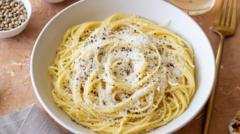Good Food's recent recipe for Cacio e Pepe has sparked backlash among Italians who are upset over the misrepresentation of this classic Roman dish, highlighting the cultural significance of authentic Italian cuisine.
Outrage in Italy Over Misrepresented Cacio e Pepe Recipe by Good Food

Outrage in Italy Over Misrepresented Cacio e Pepe Recipe by Good Food
Traditional dish garners criticism for incorrect ingredients and portrayal as a quick meal.
Italians have expressed outrage after the UK-based Good Food website published a recipe for the traditional Roman dish Cacio e Pepe, which many claim misrepresents the beloved classic. The recipe was criticized for including incorrect ingredients and for describing the dish as an easy option for a "speedy lunch," leading to widespread indignation across Italy.
Cacio e Pepe, known for its simplicity yet complexity in preparation, traditionally consists of only three ingredients: spaghetti, black pepper, and pecorino cheese. However, Good Food's version surprisingly listed four, including spaghetti, black pepper, parmesan, and butter, with an optional suggestion of double cream. This divergence from the classic recipe led Italians to unite in their discontent, with an association representing Italian restaurants even contacting the British embassy in Rome to express their displeasure.
Claudio Pica, the president of the food association, stated that he was "astonished" to see such a mistake on a reputable British food site, which was previously owned by the BBC. "The original recipe for Cacio e Pepe excludes parmesan and butter. There are not four ingredients, but three: pasta, pepper, and pecorino," he explained. The controversy has garnered significant media attention in Italy, with local journalists lamenting the misrepresentation as a "grave mistake."
Pasta restaurant owner Giorgio Eramo voiced his frustration, emphasizing that Good Food's published recipe closely resembles a different dish called 'pasta Alfredo,' while other chefs expressed concern about how the misrepresentation might mislead non-Italians about the dish's genuine preparation.
Maurizio and Loredana, who manage a family-run hotel in Rome, pointed out that while variations of the dish exist, they should not bear the original name if they alter the core recipe. The sentiment echoed across the culinary community, highlighting how deeply ingrained food traditions are in Italy's cultural identity.
Eleonora, a cafe worker in Rome, believes that while it may be unnecessary for Italians to react so strongly about the recipe, it strikes at the heart of their culinary heritage. "Our tradition is based on food," she notes, showing a deep connection between national pride and culinary authenticity.
Good Food's parent company, Immediate Media, has been solicited for a comment regarding the controversy.




















